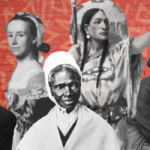Here at Our America, we believe in honoring the contributions of extraordinary individuals who have shaped our nation’s history. This Women’s History Month, we’d like to highlight 5 womens whose remarkable achievements left an indelible mark on the fabric of American society. From the battlefields of the Revolutionary War to the forefront of technological innovation, these women have demonstrated resilience, courage, and ingenuity, and unwavering dedication to their respective causes.
1. Mercy Otis Warren (1728-1814): The Revolutionary Writer
Mercy Otis Warren’s legacy as a revolutionary thinker and writer is etched in the annals of American history. Born to the famous early American lawyer James Otis, Mercy was educated at home by a family tutor, delving into classical literature, ancient history, and political theory, cultivating a formidable intellect and a mastery of words that surpassed many of her male counterparts.
Mercy’s marriage to James Warren, a prominent Patriot, fueled her involvement in revolutionary politics. Together, they formed a formidable partnership, hosting clandestine planning sessions in their home and collaborating with fellow Patriots like John Adams and his wife, Abigail. These actions were important for laying the groundwork for the revolution, but it was her writings that would breathe life into the cause.
Behind her quill lay a fiery spirit, fearlessly criticizing British tyranny through satirical plays and essays that stirred the hearts of colonists and ignited the flames of liberty and resistance against British tyranny—earning her the nickname, “The Conscience of the American Revolution.” This was dangerous work and in her early days, published anonymously but later revealed her identity. After the war, Mary’s perhaps greatest impact was penning an anti-federalist pamphlet that many believe inspired the creation of the Bill of Rights.
2. Sacagawea (1788-1812): Without Her, the Lewis and Clark Expedition Might’ve Failed
Born into the Shoshone tribe, Sacagawea was kidnapped by Hidatsa warriors at just 12 years old. Despite this harrowing start, she later found herself playing a pivotal role in American history.
During the Lewis and Clark expedition, Sacagawea’s intimate knowledge of the land proved indispensable. Legend has it that she saved crucial supplies from a capsized boat, including journals, scientific instruments, medicine and provisions that would have otherwise been lost—all the while ensuring the safety of her baby and the expedition’s success.
Sacagawea’s presence wasn’t just practical; her calm demeanor and ability to communicate with different tribes often diffused tensions, smoothing the way for the expedition’s peaceful passage.
Even after the expedition, Sacagawea’s story continued to inspire. She and her husband, Toussaint Charbonneau, traveled to St. Louis with their son, Jean Baptiste, where Sacagawea’s presence intrigued and captivated many, leaving an indelible mark on the city’s history.
3. Sojourner Truth (1797-1883): A Voice for Truth and Justice
Born into slavery by the name of Isabella Baumfree in New York (1797), Sojourner’s early life was marked by hardship and injustice. Yet, she rose above adversity, escaping to freedom with her infant daughter in 1826—a courageous act that would define her legacy of resilience and determination.
In 1828, she successfully sued to recover her son, Peter, who had been illegally sold into slavery in Alabama, becoming one of the first Black women to win such a case against a white man. Her landmark case set a precedent for Black mothers fighting for the return of their children.
In 1843 she experienced a profound spiritual awakening, and changed her name to Sojourner Truth, because she felt God calling her to preach the truth. Despite having a steady job and family, she reportedly told her friends, “The Spirit calls me, and I must go”. She took to the roads, traversing the country to bear witness to the truth. From humble gatherings to grand assemblies, her message revealed the horrors of slavery, and wielded a powerful righteousness that stirred hearts and minds to action.
Naturally, She also fought for women’s rights. In 1851, Sojourner’s speech, “Ain’t I a Woman?” became her most notable, confronting the oppression faced by Black women—a topic largely ignored by feminist at the time. Her poignant words forced the predominantly white audience to confront their own biases and recognize the inherent dignity and worth of all women, regardless of race.
Sojourner Truth’s story serves as a testament to the power of courage, faith, and action in the face of adversity. Her unwavering commitment to truth and justice continues to inspire generations, reminding us that ordinary individuals can catalyze extraordinary change.
4. Clara Barton (1821-1912):
Clara Barton is best known as the founder of the American Red Cross, but her humanitarian journey began long before. At just 18 she established a school for mill workers’ children. Later, she played a pivotal role in creating Bordentown, New Jersey’s first free school, but resigned in protest when the school hired a man at twice her salary, refusing to work for less than her male counterparts.
Just two years later, she became the first woman appointed as a recording clerk at the US Patent Office in Washington, DC. Barton faced discrimination from Secretary of the Interior Robert McClelland, and was fired but later reinstated as a copyist after President Abraham Lincoln’s election in 1860.
When the Civil War erupted, she left her impressive career behind, and embarked on a mission to bring supplies to Union soldiers and tend to the wounded as a nurse. Barton was present at every major battle in Maryland, Virginia, and South Carolina, and earned the moniker “Angel of the Battlefield” for her courageous efforts in treating wounded soldiers amidst the horrors of war. After the war, Barton continued her humanitarian work, assisting in locating missing soldiers, marking graves, and advocating for the rights of freed slaves.
Barton’s most enduring legacy, however, lies in the founding of the American Red Cross. Established on May 21, 1881, the organization has since become a pillar of global humanitarian aid. It was the first organization of its kind in America, organizing volunteers to provide relief to victims of natural disasters, including hurricanes, floods, fires and famines. Today, the American Red Cross continues to uphold Barton’s vision, providing aid to millions affected by disasters, both natural and man-made. From providing lifesaving blood donations to offering disaster relief and emergency preparedness training, the impact of the Red Cross is immeasurable.
With over 90% of its workforce composed of volunteers, the American Red Cross remains a testament to the power of community-driven solutions. Thanks to Clara Barton’s unwavering dedication, millions of lives have been touched, and countless communities have been uplifted in times of need.
5. Grace Hopper (1906-1992):
Grace Hopper wasn’t just a computer scientist—she was a pioneer whose contributions revolutionized the world of technology. Born on December 9, 1906, in New York City, Grace had an insatiable curiosity and a passion for problem-solving from an early age.
In 1944, Grace Hopper joined the U.S. Navy Reserve, where she made her mark as a trailblazing programmer. Her groundbreaking work on the Mark I computer laid the foundation for modern computing. She co-developed COBOL, one of the earliest standardized computer languages. COBOL was a game-changer, enabling computers to respond to words in addition to numbers. Grace’s visionary approach to programming transformed the landscape of data processing, setting the stage for a new era of digital innovation, and earning her the nickname “Amazing Grace”.
Grace Hopper was a trailblazer for women in STEM. Despite facing discrimination and skepticism due to her gender, she persisted, becoming one of the first female admirals in the U.S. Navy and inspiring generations of women to pursue careers in technology. Grace Hopper’s legacy lives on in every line of code, in every software application, and in every woman who dares to defy expectations and pursue her passions in STEM.

